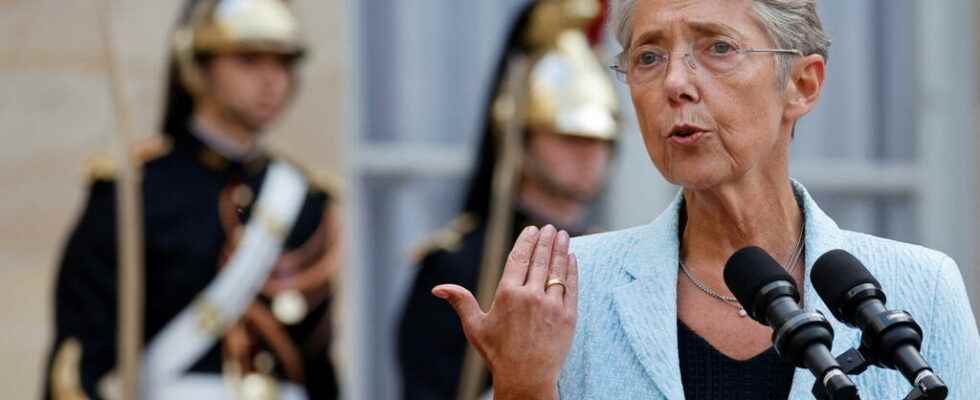The composition of the new French government is finally known. This Friday, May 20, 2022, Prime Minister Élisabeth Borne delivered the list of her ministers, almost a month after the re-election of Emmanuel Macron as president and three weeks before the June legislative elections.
A month after the re-election of Emmanuel Macron, and three weeks before the legislative elections, France finally got a new government on Friday, oscillating between renewal and recycling.
Among the surprises given on the steps of the Élysée Palace by Secretary General Alexis Kohler are the allocation of the portfolio of Minister of Foreign Affairs to the diplomat Catherine Colonna or the arrival at Culture of Rima Abdul Malak, until there adviser to Emmanuel Macron.
But the center of attraction is the arrival at the Ministry of Education of 56-year-old Pap Ndiaye, who until now ran the Palais de la Porte Dorée, and therefore the Museum of the History of Immigration. This intellectual, specialist in the social history of the United States and minorities, will be responsible for succeeding Jean-Michel Blanquer at the head of a live ministry, crossed by social tensions.
►Also read: France: the left awaits the new Prime Minister Elisabeth Borne at the turn
Catherine Colonna, she is already experienced in the workings of the State, having been Minister of European Affairs from 2005 to 2007 and spokesperson for the Elysée under Jacques Chirac. The new head of French diplomacy, who arrives in an international context marked by the war in Ukraine, has been ambassador to the United Kingdom since September 2019.
Renewal of several figures from Act I
Like the appointment on Monday at Matignon of Élisabeth Borne, former Minister of Labour, the first government of Macron’s second five-year term is also marked by the renewal of several figures from Act I.
Some keep their wallets: this is the case of the heavyweights Bruno Le Maire (Economy, finance and industrial and digital sovereignty), who obtains the status of number 2 of the government, Gérald Darmanin (Interior) and especially Eric Dupond-Moretti (Justice), despite conflicting relations with the magistrates’ unions. Clément Beaune remains for his part the Mr. Europe of the executive, and Franck Riester in Foreign Trade.
This is how Amélie de Montchalin (ex-Public Service) becomes Minister for Ecological Transition and Territorial Cohesion and Agnès Pannier-Runacher (ex-Industry) obtains the portfolio of Minister for Energy Transition . The two women will form with Elisabeth Borne, directly in charge of ecological and energy planning, the “ecological” triumvirate of the government.
Game of musical chairs
Sébastien Lecornu (ex-Overseas) won for his part the Armies in replacing Florence Parly, Marc Fesneau (ex-Relations with Parliament) will go to Agriculture, Brigitte Bourguigon (ex-Autonomy) takes the lead by going to Health, while the Ministry of Labor falls to Olivier Dussopt (ex-Budget), with the pension reform in the background. A figure in the management of the Covid crisis, Olivier Véran takes charge of Relations with Parliament, while Gabriel Attal is sent to Public Accounts. Olivia Grégoire succeeds him as spokesperson.
Among the political entrants, the arrival of Damien Abad focuses attention and reflects the continued fracturing of the right by Emmanuel Macron. Former boss of the LR deputies, who slammed the door of his party this week, obtains a ministry of Solidarity, autonomy and disabled people. Close to Edouard Philippe, the mayor of Angers Christophe Béchu has been appointed minister delegate in charge of local authorities.
And some historical walkers are rewarded, in the forefront of which the boss of the party Stanislas Guerini, Minister of Transformation and the public service, the president of the Commission of the Laws of the Assembly Yaël Braun-Pivet, promoted to Overseas, or even Amélie Oudéa-Castera, former CEO of the Tennis Federation (FFT), who accesses Sports. The president of the University of Paris-Saclay Sylvie Retailleau takes the head of Higher Education and Research, and the magistrate Isabelle Rome will be in charge of gender equality.
The first Council of Ministers will be held on Monday May 23 around President Emmanuel Macron.
(With AFP)
The government list
Minister for Europe and Foreign Affairs, Catherine Colonna
Minister of Ecological Transition, Agnes Pannier-Runacher
Minister of National Education and Youth, Pap Ndiaye
Minister of Economy, Finance and Industrial and Digital Sovereignty, Bruno the Mayor
Minister of the Armed Forces, Sebastien Lecornu
Minister of the Interior, Gerald Darmanin
Minister of Labour, Employment and Integration, Olivier Dussopt
Minister of Overseas, Yael Braun-Pivet
Minister for Ecological Transition and Territorial Cohesion, Amelie de Montchalin
Keeper of the Seals, Minister of Justice, Eric Dupond Moretti
Minister of Culture, Rima Abdul Malak
Minister of Health, Brigitte Bourguignon
Minister of Solidarity, Autonomy and People with Disabilities, Damien Abad
Government Spokesperson, Olivia Gregoire
Minister of Higher Education, Research and Innovation, Sylvie Retailleau
Minister of Agriculture and Food, Marc Fesneau
Minister of Transformation and Public Service, Stanislas Guerini
Minister of Sports and the Paris Olympic Games, Amelie Oudea-Castera
Minister of Overseas, Yael Braun-Pivet
Minister in charge of foreign trade, Frank Riester
Minister Delegate in charge of Public Accounts, Gabriel Attal
Minister delegate in charge of relations with Parliament and democratic life, Olivier Veran
Minister delegate in charge of local authorities, Christophe Bechu
Minister Delegate for Gender Equality, Diversity and Equal Opportunities, Isabel Rome
Secretary of State for Europe, Clement Beaune
Secretary of State for the Sea, attached to the Prime Minister, Justine Benin
Secretary of State for Children, Charlotte Caubel
Secretary of State for Development, Francophonie and International Partnerships, to the Minister for Europe and Foreign Affairs, Chrysoula Zacharopoulou
